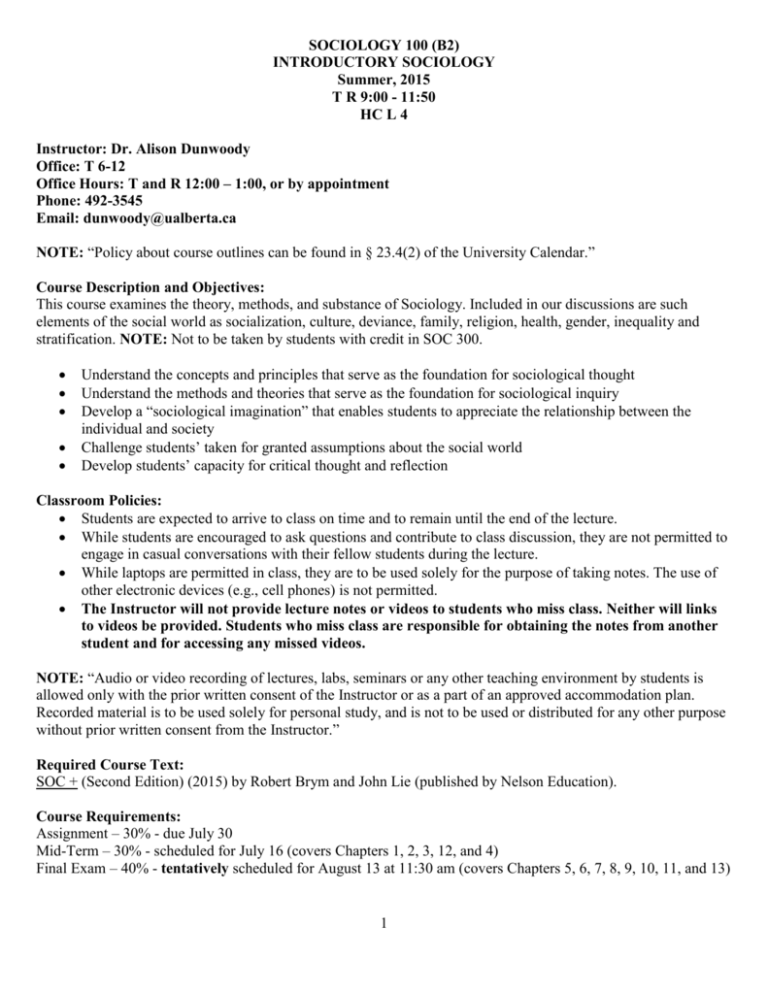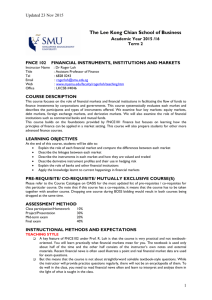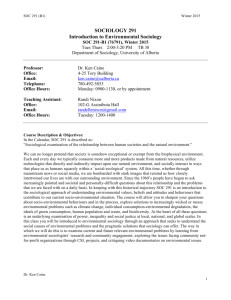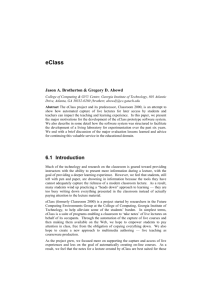SOC 100 - Sociology - University of Alberta
advertisement

SOCIOLOGY 100 (B2) INTRODUCTORY SOCIOLOGY Summer, 2015 T R 9:00 - 11:50 HC L 4 Instructor: Dr. Alison Dunwoody Office: T 6-12 Office Hours: T and R 12:00 – 1:00, or by appointment Phone: 492-3545 Email: dunwoody@ualberta.ca NOTE: “Policy about course outlines can be found in § 23.4(2) of the University Calendar.” Course Description and Objectives: This course examines the theory, methods, and substance of Sociology. Included in our discussions are such elements of the social world as socialization, culture, deviance, family, religion, health, gender, inequality and stratification. NOTE: Not to be taken by students with credit in SOC 300. Understand the concepts and principles that serve as the foundation for sociological thought Understand the methods and theories that serve as the foundation for sociological inquiry Develop a “sociological imagination” that enables students to appreciate the relationship between the individual and society Challenge students’ taken for granted assumptions about the social world Develop students’ capacity for critical thought and reflection Classroom Policies: Students are expected to arrive to class on time and to remain until the end of the lecture. While students are encouraged to ask questions and contribute to class discussion, they are not permitted to engage in casual conversations with their fellow students during the lecture. While laptops are permitted in class, they are to be used solely for the purpose of taking notes. The use of other electronic devices (e.g., cell phones) is not permitted. The Instructor will not provide lecture notes or videos to students who miss class. Neither will links to videos be provided. Students who miss class are responsible for obtaining the notes from another student and for accessing any missed videos. NOTE: “Audio or video recording of lectures, labs, seminars or any other teaching environment by students is allowed only with the prior written consent of the Instructor or as a part of an approved accommodation plan. Recorded material is to be used solely for personal study, and is not to be used or distributed for any other purpose without prior written consent from the Instructor.” Required Course Text: SOC + (Second Edition) (2015) by Robert Brym and John Lie (published by Nelson Education). Course Requirements: Assignment – 30% - due July 30 Mid-Term – 30% - scheduled for July 16 (covers Chapters 1, 2, 3, 12, and 4) Final Exam – 40% - tentatively scheduled for August 13 at 11:30 am (covers Chapters 5, 6, 7, 8, 9, 10, 11, and 13) 1 Grading Policy: Grades will not be assigned on the basis of a particular distribution (e.g., bell curve) but will be assigned based on the individual merits of students. Grades are not negotiable. While guidelines for grading are provided by the University, they are to be thought of as just that, guidelines. Consequently, while the distribution of grades for this course will likely approximate these guidelines, it will not necessarily correspond with them exactly. Assignment: A description of the assignment and the criteria by which it will be evaluated have been posted on eClass. All assignments are due IN CLASS by 9:00 am on July 30. E-mail submissions will not be accepted under any circumstances. Late assignments will have 10% deducted per day beyond the due date (including weekends) and assignments more than one week late will not be accepted. Mid-Term and Final Exam: The mid-term and the final exam will be comprised of multiple choice questions. Students are responsible for all lecture notes, class discussions, videos and assigned readings from the text. Sample exam questions will be posted on eClass at the conclusion of our coverage of each chapter. Neither absence from class nor travel plans will be accepted as legitimate reasons for failure to attend an exam. An unexcused absence will result in a grade of zero for that exam. Should a student miss a mid-term, he or she must contact the Instructor via e-mail within two working days of the originally scheduled exam, or as soon as the student is able, having regard to the circumstances underlying the absence. Please note that depending upon the circumstances, appropriate documentation may be required (e.g., “Medical Declaration Form for Students,” “Statutory Declaration,” police report, death notice, court documents). Students with an excused absence must write the missed exam rather than shift the weight of that exam to other course requirements. If a student fails to write the final exam, he or she must formally apply to his or her Faculty within two working days following the missed exam, or as soon as the student is able, having regard to the circumstances underlying the absence, in order to be considered for a deferral. The decision to grant a deferred final exam is not the Instructor’s. Deferred examinations are intended to accommodate students who have experienced an incapacitating illness or severe domestic affliction; applications based on minor or inconsequential ailments will not be approved. Please also note that as stated in § 23.3(2)c of the Calendar, “a deferred examination will not be approved if a student (a) has not been in regular attendance where attendance and/or participation are required, and/or, (b) excluding the final exam, has completed less than half of the assigned work.” Tentative Lecture Schedule and Assigned Readings: Date Topic July 7 Overview of Course and “Introducing Sociology” July 9 “Culture” and “Socialization” July 14 “The Mass Media” and “From Social Interaction to Social Organizations” July 16 Mid-Term (covers Chapters 1-4 and 12) July 21 “Deviance and Crime” July 23 “Social Stratification: Canadian and Global Perspectives” July 28 “Race and Ethnicity” July 30 “Sexuality and Gender” Aug 4 “Families” Aug 6 “Religion and Education” Aug 11 “Health and Medicine” and “Technology, the Environment, and Social Movements” Reading Ch 1 Ch 2 & 3 Ch 12 & 4 Ch 5 Ch 6 Ch 7 Ch 8 Ch 9 Ch 10 Ch 11 & 13 Class attendance is NOT optional. Periodically, videos will be shown in class, details from which are considered testable material. It is students’ responsibility to ensure that they have all necessary materials in preparation for 2 exams as neither lecture notes nor videos will be made available outside of class. Lecture outlines will be posted on eClass the evening prior to each class. However, outlines should not be taken as a substitute for attending class as important information may not be covered in the outlines. Grading: Description Percentage Grade Value Excellent 95 – 100 90 – 94.9 85 – 89.9 A+ A A- 4.0 4.0 3.7 Good 80 – 84.9 75 – 79.9 70 – 74.9 B+ B B- 3.3 3.0 2.7 Satisfactory 66 – 69.9 62 – 65.9 58 – 61.9 C+ C C- 2.3 2.0 1.7 Poor Minimal Pass 54 – 57.9 50 – 53.9 D+ D 1.3 1.0 Fail 0 – 49.9 F 0.0 Academic Integrity: The University of Alberta is committed to the highest standards of academic integrity and honesty. Students are expected to be familiar with these standards and to uphold the policies of the University in this respect. Students are particularly urged to familiarize themselves with the provisions of the Code of Student Behaviour (www.governance.ualberta.ca) and avoid any behaviour which could potentially result in suspicions of cheating, plagiarism, misrepresentation of facts and/or participation in an offence. Academic dishonesty is a serious offence and can result in suspension or expulsion from the University. Students are also advised to consult the Office of Student Judicial Affairs webpage (www.osja.ualberta.ca/en/Students.aspx) regarding the definitions of plagiarism and its consequences when detected. An Instructor or coordinator who is convinced that a student has handed in work that he or she could not possibly reproduce without outside assistance is obliged, out of consideration of fairness to other students, to report the case to the Associate Dean of the Faculty. Before unpleasantness occurs, students should consult the OSJA webpage and discuss this matter with any tutor(s) and with their Instructor. 3









